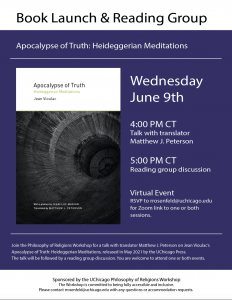Please join the Philosophy of Religions Workshop on Wednesday, June 9th for a talk with translator Matthew J. Peterson (PhD Candidate, Divinity School) on Jean Vioulac’s Apocalypse of Truth: Heideggerian Meditations, released this month by the UChicago Press. The talk will be followed by a reading group discussion, which will simply be an opportunity for those who have read the book to discuss it with others in the workshop community. You are welcome to attend one or both events.
Book Launch & Reading Group
Apocalypse of Truth: Heideggerian Meditations
Wednesday, June 9th
4:00pm CT
Talk with translator Matthew J. Peterson
5:00pm CT
Reading group discussion
Virtual Event
RSVP to rrosenfeld@uchicago.edu for Zoom link to one or both sessions.
The book may be purchased through the Seminary Co-op Bookstore or other booksellers.
About the book: We inhabit a time of crisis—totalitarianism, environmental collapse, and the unquestioned rule of neoliberal capitalism. Philosopher Jean Vioulac is invested in and worried by all of this, but his main concern lies with how these phenomena all represent a crisis within—and a threat to—thinking itself. In his first book to be translated into English, Vioulac radicalizes Heidegger’s understanding of truth as disclosure through the notion of truth as apocalypse. This “apocalypse of truth” works as an unveiling that reveals both the finitude and mystery of truth, allowing a full confrontation with truth-as-absence. Engaging with Heidegger, Marx, and St. Paul, as well as contemporary figures including Giorgio Agamben, Alain Badiou, and Slavoj Žižek, Vioulac’s book presents a subtle, masterful exposition of his analysis before culminating in a powerful vision of “the abyss of the deity.” Here, Vioulac articulates a portrait of Christianity as a religion of mourning, waiting for a god who has already passed by, a form of ever-present eschatology whose end has always already taken place. With a preface by Jean-Luc Marion, Apocalypse of Truth presents a major contemporary French thinker to English-speaking audiences for the first time.
About the translator: Matthew Peterson is a doctoral candidate in the philosophy of religions at the University of Chicago Divinity School. His writing has appeared or is forthcoming in Continental Philosophy Review and The Journal of Religion.
_____________________
The Workshop on the Philosophy of Religions is committed to being a fully accessible and inclusive workshop. Please contact Workshop Coordinators Tyler Neenan (tjneenan@uchicago.edu) or Rebekah Rosenfeld (rrosenfeld@uchicago.edu) in order to make any arrangements necessary to facilitate your participation in workshop events.



